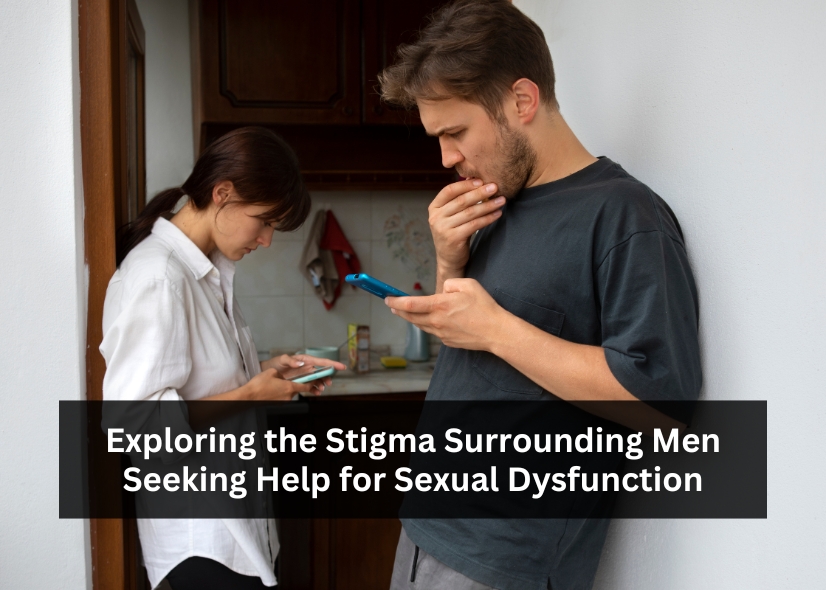Understanding Sexual Dysfunction
Sexual dysfunction encompasses a range of issues that interfere with a person’s ability to experience satisfaction or pleasure during sexual activity. For men, common forms of sexual dysfunction include erectile dysfunction (ED), premature ejaculation, and low libido. These issues can arise due to various factors, including physical health conditions, psychological factors, relationship problems, or lifestyle choices.
The Stigma
Despite the prevalence of sexual dysfunction, societal attitudes often contribute to the stigma surrounding men seeking help for these issues. Masculinity norms dictate that men should be virile, sexually potent, and always ready for intercourse. As a result, men experiencing sexual difficulties may feel emasculated or inadequate, leading to feelings of shame, embarrassment, and reluctance to seek help.
Moreover, the portrayal of male sexuality in media and popular culture reinforces unrealistic standards, further perpetuating the stigma. Men are often depicted as always being sexually confident and satisfied, which can create unrealistic expectations and further isolate those experiencing sexual difficulties.
Cultural and religious beliefs may also play a role in perpetuating stigma, with discussions about sexual health considered taboo or inappropriate in many societies. This cultural silence can prevent men from seeking the support and guidance they need to address their concerns effectively.
The Consequences
The stigma surrounding men seeking help for sexual dysfunction can have profound consequences on both individual and societal levels. From a personal standpoint, untreated sexual dysfunction can lead to feelings of depression, anxiety, and low self-esteem. It can strain relationships and diminish overall quality of life. Additionally, unresolved sexual health issues may indicate underlying medical conditions that require attention.
On a broader scale, the stigma surrounding men’s sexual health perpetuates harmful stereotypes and prevents meaningful discussions about sexual well-being. This silence can hinder efforts to raise awareness, educate the public, and promote access to healthcare services. It also reinforces the notion that seeking help for sexual difficulties is a sign of weakness rather than a proactive step towards improved health and vitality.
Breaking the Stigma
Breaking down the stigma surrounding men seeking help for sexual dysfunction is crucial for their well-being. Lal Clinic plays a vital role in this by providing a safe and confidential space for men to discuss their concerns. Here are some ways Lal Clinic might be breaking down the stigma:
- Confidentiality: Dr. K Lal at Lal Clinic ensures that all consultations and treatments are confidential, helping men feel more comfortable seeking help without fear of judgment.
- Education: Lal Clinic educates the public about sexual health, including common issues like erectile dysfunction, to normalize discussions and reduce stigma.
- Non-judgmental Environment: Dr. K. Lal at Lal Clinic creates a non-judgmental environment where men can openly discuss their concerns without feeling ashamed or embarrassed.
- Holistic Approach: Lal Clinic takes a holistic approach to sexual health, addressing physical, emotional, and psychological factors that may contribute to sexual dysfunction.
- Community Support: Lal Clinic may provide support groups or online forums where men can connect with others facing similar issues, reducing feelings of isolation and stigma.
- Awareness Campaigns: Lal Clinic may run awareness campaigns to de-stigmatize seeking help for sexual dysfunction and promote the importance of sexual health.
By implementing these strategies, Lal Clinic can help break down the stigma surrounding men seeking help for sexual dysfunction and encourage more men to prioritize their sexual health.
The stigma surrounding men seeking help for sexual dysfunction is a pervasive issue that has far-reaching implications for individual health and societal attitudes towards sexuality. By fostering open dialogue, challenging stereotypes, and promoting education and awareness, we can break down barriers and create a culture of acceptance and support for men’s sexual health. Ultimately, by addressing the stigma surrounding sexual dysfunction, we can empower men to seek help, improve their quality of life, and promote healthier attitudes towards sexuality for future generations.

